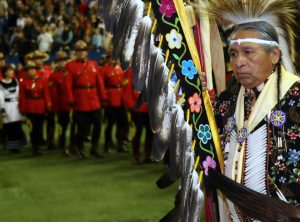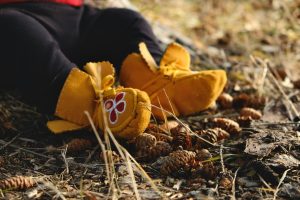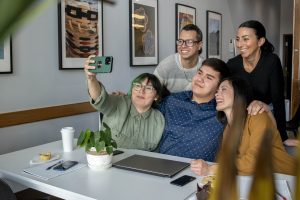Allyship

Warm Up
In partners or small groups ask each the following questions:
- What is an ally?
- Do you know of any famous allies?
- What is something of importance that you have learned about the history of Indigenous People so far in this course?
- Why is it so important to you?
Vocabulary Preview
Match the word with the definition. If you are not sure, look up the word in the dictionary (new tab).
Vocabulary Review – Text version
Words:
- commission
- allyship
- ally
- acknowledgement
- struggle
- legacy
- call to action
- decolonization
- Reconciliation
- dignity
- token
Definitions:
- The active support for the rights of minority or marginalized group without being a member of it.
- The active support for the rights of minority or marginalized group without being a member of it.
- The act of becoming friendly again after conflict.
- The act of admitting or accepting that something is true.
- To have a difficult time with.
- A symbol or sign of something bigger.
- The fact of being respected or deserving respect.
- A person who supports another when others are trying to oppose you.
- A group of people who have given control to find out something.
- The next step in the process of getting things done.
- Something that is left or exists as a result of things that happened at an earlier time.
Check your Answer in Footnote[1]
Practice the new vocabulary by asking and answering the following questions with a partner. Make sure to use the new vocabulary word in your answer.
- Have you ever had a reconciliation with anyone after a fight or an argument? What happened?
- Are you an ally to anyone that you know of? Explain.
- Why is allyship important?
- Why is it important to have dignity?
- Why is it important to feel acknowledged about something you have done well?
- What is something you struggle with?
- Do you know of any commissions in your first country that are/were tasked with finding the truth about something?
- What cultural tokens symbolize your country?
- What historical figure has left a significant legacy in your opinion?
- How can individuals contribute to positive change in their communities, and what specific call to action would you suggest to inspire others to join in?
Activity source: Vocabulary Preview – Allyship by Virginia McHardy is licensed under CC BY-NC 4.0
Allyship and the Truth and Reconciliation Commission

In learning about the history and culture of Indigenous people in Canada, we have a responsibility. This responsibility is to learn as much as we can and to support the Indigenous communities. You are already doing that by taking this course. The more you learn, the more you can become an ally to Indigenous people.
What does it mean to be an ally?
Because there is an enormous amount of information about the history and culture of Indigenous, there is always something new to learn. Being an ally is to continue learning and to support Indigenous communities, events and individuals. It is about standing up for the truth and educating others along the way. There are several responsibilities of being an ally and according to Dr. Lynn Gehl (2012), here are just a few of them.
Responsible Allies:
- understand they are secondary to the Indigenous people that they are working with and that they seek to serve. They and their needs must take a back seat;
- acknowledge their privileges and openly discuss them;
- think deeply and accept that they don’t fully understand the struggle faced by Indigenous people. Always remember this lack of understanding. Otherwise, not realizing their ignorance could continue to harm Indigenous people;
- think about how people within oppressed groups sometimes mistreat each other. This mistreatment can happen between people who are equal in power, like women. Make sure their actions don’t make this mistreatment worse.
- constantly listen and reflect;
You can read the whole list of responsibilities at My Ally Bill of Responsibilities [PDF, new tab].
It is important to know that you are going to make mistakes along the way to becoming an ally. However, you don’t want to be feeding your ego, having your own agenda, inserting your own opinions by discounting Indigenous voices, trying to have a token identity or making the conversation about you. Keep listening, reading, researching, asking questions, building relationships and supporting the community in meaningful ways.
What is the Truth and Reconciliation Commission?
Part of becoming an ally is learning about the Truth and Reconciliation Commission (TRC). In 2007, the largest class-action settlement in the history of Canada began. That settlement included setting up the Truth and Reconciliation Commission which was provided $72 million to support the work which took 6 years and included over 6,500 witness testimonies about the history and legacy of residential schools system. In 2015, the TRC submitted a 6-volume report about the terrible atrocities committed in residential schools and the aftermath of those events. The TRC was also the start of a new relationship between the Government of Canada and Indigenous communities, one that is based on the recognized rights, dignity, cooperation and partnerships of Indigenous peoples. Part of the final report also included 94 Calls to Action to help start this new relationship. Some of the Calls to Action include making age-appropriate curriculum to teach residential schools, treaties and aboriginal rights in Canadian schools from kindergarten to Grade 12, asking the Pope to formally apologize to the survivors and their families of residential schools, revising the information kit for newcomers to Canada and its citizenship test to reflect a more inclusive history of Indigenous people, and calling upon post-secondary institutions to create university and college degree and diploma programs in Indigenous languages. You can read more about all 94 Calls of Action on the Delivering on Truth and Reconciliation Commission Calls to Action [new tab] website.
This reading piece was inspired by the following resources:
Gehl, L. (2012). Ally Bill of responsibilities by Dr. Lynn Gehl, Algonquin, Anishinaabe-kwe. https://www.lynngehl.com/uploads/5/0/0/4/5004954/ally_bill_of_responsibilities_poster.pdf
Swiftwolfe, D. (n.d.). Indigenous Ally toolkit. https://www.ontariopresents.ca/resources/indigenous-ally-toolkit
Government of Canada. (2022, September 29). Truth and Reconciliation Commission of Canada. https://www.rcaanc-cirnac.gc.ca/eng/1450124405592/1529106060525
Comprehension Questions
From the reading, answer the following questions in your own words:
- What does it mean to be an ally?
- What are some responsibilities for an ally?
- What are some things you should NOT do as an ally?
- What is the Truth and Reconciliation Commission?
- Why is the TRC important?
- What are some Calls to Action?
Discussion Questions
-

Source: Image by Shelby Lisk, Free to use from CIRA Indigenous stock images What does being an ally to Indigenous Peoples mean to you?
- What are some challenges that may arise when trying to be an ally to Indigenous Peoples?
- Have you personally witnessed or experienced any examples of allyship towards Indigenous Peoples? If so, what were they?
- How can we raise awareness about the issues affecting Indigenous Peoples in Canada within our communities?
- In what ways can allyship be sustained and integrated into everyday actions and behaviors?
Assignment/Homework
Myth Busters Assignment
A. Choose a myth from the list below, research it and find out why the myth is incorrect or untrue and how to debunk it:
- Indigenous Peoples are all the same.
- Indigenous Peoples already have more than enough reserve lands and resources that they don’t need any more.
- Indigenous Peoples get free housing on reserves.
- Indigenous Peoples don’t have to pay taxes.
- Indigenous Peoples receive free postsecondary education
- Indigenous Peoples are protected by treaties, guaranteeing income and rights.
- Indigenous Peoples are responsible for their current situation.
- Indigenous Peoples do not have a good work ethic. They are lazy.
- Indigenous Peoples are all drunks.
Attribution
Except where otherwise noted, Allyship by Virginia McHardy is licensed under CC BY-NC 4.0.
- 1. allyship, 2. decolonization, 3. Reconciliation, 4. acknolwedgement, 5. struggle, 6. token, 7. dignity, 8. ally, 9. commission, 10. call to action, 11. legacy ↵

